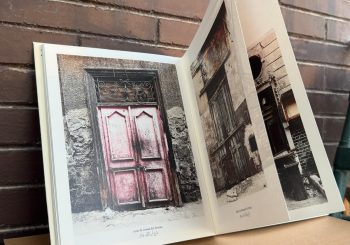
“I realized one day while I was getting dressed that I didn’t recognise the girl in the mirror at all. I looked very different, and it’s very scary for you to look at someone that you know really well and not know who that person is,” Yasmina Nessim, fashion psychologist and founder of Pstyled, says.
There are many layers to self-love that often go unnoticed, and realizing what it means to live in the rawness of who we are and in the fullness of our full potential is affected by standards and expectations imposed by the fashion industry.
The fashion industry’s standards of beauty contribute to the societal pressure that distorts women’s perception of self- worth and body image, as a survey conducted by skincare tool brand, Foreo, revealed that 61 percent of women suffer from ‘compare and despair’ syndrome, which means that they regularly compare their appearance to others.
But this is slowly starting to change. The fashion and beauty industry today has become more involved in mental health awareness. The rise of body positivity campaigns has helped more people to support brands that embrace and accept themselves, and a growing group of beauty brands are incorporating mental health in their products, such as the skincare brand Selfmade which pairs its products with an application called CommonRoom that informs users about therapeutic concepts that bolster their emotional aptitude.
The world is slowly starting to realize that fashion or beauty is not purely visual, but also has a huge impact on our senses, and how these sensations are processed and interpreted in the brain.

Being the first kind of fashion psychologist in her field, and the first in Egypt, Nessim’s Pstyled is the first service to use style curation to boost mood, optimize productivity, and inspire self-expression. What is particularly intriguing and unique about the service is that it does not force you to completely change your entire closet, but uses the content of your existing closet and fashions daily outfits based on your physical and psychological traits.
“It is self-love through the ritual of getting dressed,” the website proclaims.
The story behind ‘Pstyled’ is in itself a journey of self-empowerment and self-love, which was poured into the platform’s core service and identity.
“At one point in my life, I think I was in my early 20s, where I had just graduated from business management in London and I did my master’s in strategic marketing and organizational psychology, and I started going through a lot of really heavy things in my personal life,” says Nessim. “I realized one day while I was getting dressed that I didn’t recognise the girl in the mirror at all. I looked very different, and it’s very scary for you to look at someone that you know really well and not know who that person is.”
“It’s very scary feeling completely isolated from yourself,” she says.
The next morning, Nessim decided to flip the script. She put on something completely different which she had not worn in a very long while, and it was the very first time for her to realize just how much a simple change of item can impact her day-to-day life.
“I went out and I was more social. I worked harder at the office. I didn’t binge eat, and I remember feeling like I’m also super happy,” she recalls. “I came home and I started thinking about the relationship between psychology and fashion. I kept trying to read and look for articles to understand the relationship.”
“The idea just kept working in my head and after applying it to myself day after day for months, I decided I wanted to do this as a job. I wanted to help other women. I wanted to help men who were experiencing similar things. I wanted to basically turn it into something real,” she adds.
In 2012, researchers from Northwestern University found that wearing specific articles of clothing had an effect on the wearer’s psychology and performance. The researchers concluded that clothes have a symbolic meaning. When we wear an article of clothing with a specific meaning, these clothes can influence our psychological state, which is called “enclothed cognition.” The study revealed that what we wear, and the symbolic meaning we associate with specific fashion items, has measurable effects on our mental state.
View this post on Instagram
In short, enclothed cognition explains how clothes can help develop our identities and trigger the inner qualities that have been hidden for a long time. But it is much deeper than just putting on an amazing dress or wearing bright colors to feel better about yourself, the key is to find clothes that are in alignment with our inner state and our core personalities.
“Fashion psychology isn’t just color psychology in general, because you can apply the color psychology for each individual person to really get into their subconscious and understand why they wear a certain color when they’re depressed. For instance, I would never tell you to wear yellow because yellow is a happy color. I want to know what color makes you happy,” Nessim says.
Inside Her Sessions
Nessim’s sessions are akin to going to a nutritionist, who is expected to give you alternatives and actual meals to implement into your diet to make you feel better. In the same way, she begins by understanding the person’s own personality and journey, and then suggests alternatives to how they can dress.
“I have two different kinds of sessions. The first session is sort of like the baby session, and the way that works is that we have a very casual 30-minute conversation. Based on that, I will send an email and share pointers about what you could use from fashion psychology to implement styles in your life,” she explains.
“But in the main package, you come to the office and we sit down and we have some coffee, and then we have like an hour conversation where we get deeper, and speak about your motivations, your obstacles, who you want to be in a year or six months, and the things that you feel like are stopping you from getting connected to that version of yourself,” she says. “After doing a personality test, and based on everything that we talked about, I pinpoint actual outfits that I recommend you should wear.”
Getting dressed essentially becomes an art of sharing your story to the world, and your own message.
“Everyone has a beautiful, unique story and personality. They really should invest in getting to know themselves and dressing for that and telling the world that this is who I am,” she says. “You have to envision who you want to be and wake up for that person every single day. Every single day.”
Pstyled personifies the courage of self-expression, and fashion psychology can be a force of authenticity and self-compassion for many that can sometimes feel that they are not truly aligned.
In simple and small ways, clothes can help us align with our inner emotions and guide us to that direction of emotion, as one client of Pstyled once shared: “Today I took a page out of Pstyled and wrapped a blanket scarf around me because I woke up feeling like I need to be held for that whole day.”






Comments (2)
[…] Self-Love Through the Ritual of Dress: Meet Egypt’s Fashion Psychologist […]
[…] Self-Love Through the Ritual of Dress: Meet Egypt’s Fashion Psychologist […]